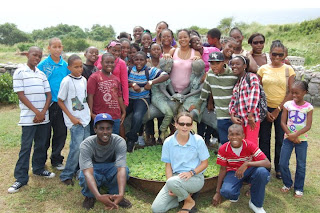It is now more than ever that I know the importance of these species. They have played a vital role in the health of our world's oceans for more than 100 million years! From maintaining coral reef ecosystems to transporting essential nutrients from the oceans to beaches and coastal dunes. With their dramatic decrease in numbers has come evidence of their importance. What threatens them?? Commercial fishing, loss of their nesting habitat and climate change...what do all of these have in common?? They are human-caused threats and they are pushing our sea turtles towards extinction. Without them, we will loose vital functions that they serve towards our ocean ecosystems.
What do we need to do....PROTECT and help them REBUILD their populations to ensure a healthy and resilient future for our oceans.
Protect their homes.
Protect them.
It broke my heart when I saw the headline today: "Up to 20,000 sea turtle eggs crushed by bulldozers on Caribbean island". What happened in Trinidad will hopefully open the eyes of those throughout the world that work to protect the world's sea turtles as well as the eyes of the public. Our impact on these creatures is becoming more than a problem...we are destroying their chances to continue their vital relationship in our world's oceans. I hope this kind of tragedy never strikes the sea turtle population again. Tourism Minister of Trinidad: This must never happen again.
"It is a tragedy what happen with these turtles , I agree... and a lot of people are to be held responsible ... I hear the cries for this one throat and that one job, but check yourself ... if you are not recycling YOU are killing more that turtles DAILY ... YES DAILY !!! mistakes happens ... actually everyone make them ... but I sure do hope this will open up the minds and heart of more people about our environment ..."-Papa Bois Conservation group
"Trinidad has the second largest number of Leatherback nestings in the world. Grande Riviere is the densest nesting beach in the world, with hundreds of turtles nesting on the beach each night at the height of turtle nesting season. The village of Grande Riviere attracts thousands of turtle tourists each year and the income generated by this is a big incentive for local turtle conservation. (Marc)
The meandering of the river is a natural occurrence, but this year the course of the river was more extreme than normal. Grande Riviere villagers have described the extent of the river's changing of course as a once in a 15 year event. The meandering river had already destroyed a portion of the beach, which also happened to be the most productive section. If the river had been left to continue its
meandering course, it would have destroyed more nests and endangered the Mon Plesir Hotel, portions of which were already eroding in to the river. Local fishermen also use the river to launch their boats, an exercise which had become difficult due to the extended course of the river, and dangerous due to surf conditions at the new mouth of the
river. Clearly action was required to contain the river.
The Grande Riviere beach falls under the jurisdiction of the Trinidad & Tobago Forestry Division. The Forestry Division would have had to give permission for the works to take place.
The complaint is that stakeholders had been asking for intervention for a long time, without a response. When the response did come, it was unplanned, unsupervised, and the way in which it was done did unnecessary damage to hatchlings and nests. An earthmoving crew was left to operate, without any qualified supervision, on one of the most environmentally sensitive beaches in the world, with a D8 bulldozer and an excavator.
Clearly the "chain of command" at the beach was broken, resulting in the unsupervised action. It is important to investigate how this was allowed to happen, and to find a solution so this won't reoccur in future. What is needed is an immediate meeting between stakeholders, including the Forestry Division, the Environmental Management Authority, Turtle Village Trust, turtle protection groups, persons representing the turtle nesting communities and other stakeholders, which would result in new, effective, procedures being put in place."-Papa Bois Conservation group
Teamwork.
Together we can.
RUSVM Students at work learning the ropes.
If we don't protect them...who will?
Community outreach here in St. Kitts.
The job gets a little messy at times :)
St. Kitts nesting leatherback.
An opportunity to learn for all.
The generation of hope for our sea turtles.
















No comments:
New comments are not allowed.